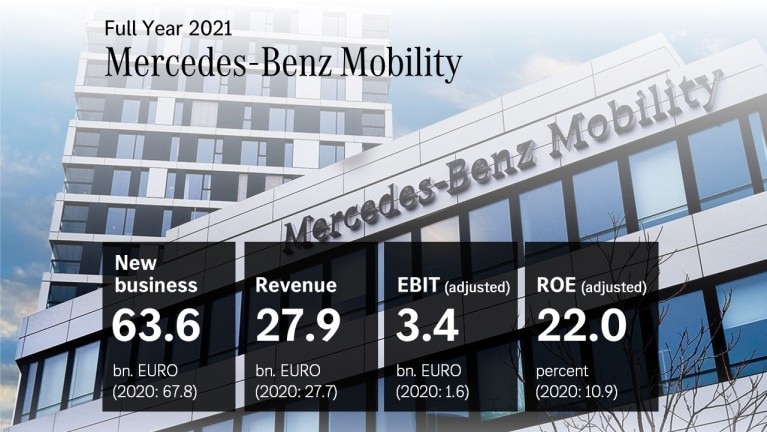
Mercedes-Benz Mobility AG
Siemensstr. 7
70469 Stuttgart
Deutschland
Tel.: +49 711 17 0
E-Mail: mobility@mercedes-benz.com
Please send queries about content on this website to any contact. You can address your concerns to us in English and your respective national language.
Represented by the Board of Management: Franz Reiner (Chairman), Jörg Lamparter, Susann Mayhead, Tolga Oktay, Peter Zieringer
Chairman of the Supervisory Board: Harald Wilhelm
Commercial Register Stuttgart, No. HRB 737788
VAT registration number: DE 81 11 20 930

Mercedes-Benz Group AG (ticker symbol: MBG) achieved strong financial results for the fiscal year 2021 ended December 31, while accelerating its strategy as a pure-play manufacturer of desirable cars and vans.
In 2021, good product mix, solid net pricing, continued cost-discipline and favourable used car performance lifted the adjusted Return on Sales (RoS) for the Mercedes-Benz Cars & Vans division to 12.7% in the full year, even as the COVID-19 pandemic and semiconductor supply chain bottlenecks continued to affect the business. Since 2019 fixed costs at Mercedes-Benz Cars have fallen by 16% while revenue per unit improved by 26% to an average €49,800 per vehicle.
Mercedes-Benz achieved several technological milestones last year: The company introduced four battery electric vehicles and attained the first internationally valid system approval for SAE-Level 3 automated driving. The EQS electric flagship received strong reviews and orders for the vehicle are currently at around 20,000 of which 3,600 came in January 2022. Mercedes-Benz is preparing to roll out a raft of new electric vehicles this year, including the EQE and EQS SUV.


"2021 was a year of strategic progress for Mercedes-Benz. Three numbers illustrate how this transformation is gaining traction: Top-end vehicle sales rose by 30%, sales of electric cars surged 64%, and our adjusted EBIT increased by 105%. That’s a strong demonstration of the potential of this brand and this team. I want to extend my deepest gratitude to all our colleagues who made this excellent result possible. With a clear agenda for this year we are confident about 2022. Aside from the relentless focus on cost efficiency and supply chain management, our strategic priorities are: Scaling electric vehicles, accelerating our car-software plans and growing our luxury business."
Ola Källenius
Chairman of the Board of Management of Mercedes-Benz Group AG
On February 1, 2022 the previous Daimler AG was renamed Mercedes-Benz Group AG and Daimler Mobility AG became Mercedes-Benz Mobility AG. The former Daimler Trucks & Buses division was listed on the Frankfurt Stock Exchange on December 10, 2021. Figures within financial statements have therefore been split into continued and discontinued operations. In line with the newly formed Group divisions, the reporting structure and the prior-year figures have been adjusted accordingly. All figures are preliminary and unaudited.
In the fourth quarter, the company realized a one-time Group EBIT gain of €9.2 billion from deconsolidation, due to the spin-off of the Daimler commercial vehicle business. This one-time EBIT effect has no impact on the cash flow and no material impact on taxes. It is the perspective of the management that this is a pure valuation effect and has therefore been excluded from the basis for determining the dividend proposal.
Mercedes-Benz Group revenue reached €168 billion (2020: €154.3 billion). The share from continuing operations was €133.9 billion (2020: €121.8 billion). Group EBIT was €29.1 billion (2020: €6.6 billion), thereof the share from continuing operations was €16.0 billion (2020: €6.1 billion). Adjusted EBIT, reflecting the underlying business, was €19.2 billion (2020: €8.6 billion). Group net profit was €23.4 billion (2020: €4.0 billion). The share from continuing operations was €11.1 billion (2020: €4.0 billion).
In 2021, net profit excluding the deconsolidation result rose to €14.2 billion (2020: €4.0 billion). Earnings per share, excluding the deconsolidation result, rose by 280% to €12.89 (2020: €3.39).
Thanks to a tight grip on working capital and investments, the strong profitability translated into a solid level of free cash flow. The free cash flow of the industrial business was €8.6 billion (2020: €8.3 billion), including important upfront investments in future products. The adjusted free cash flow of the industrial business was €10.9 billion (2020: €9.2 billion). The net liquidity of the industrial business amounted to €21.0 billion (end of Q3 2021: €23.5 billion/end of 2020 €17.9 billion), even after the spin-off of Daimler Truck. The Group’s investments in property, plant and equipment in the full year totaled €3.8 billion from continued operations (2020: €4.9 billion). Research & development expenditure for 2021 for continued activities amounted to €7.7 billion (2020: €7.2 billion).
At Mercedes-Benz Mobility, new business fell by 6% to €63.6 billion (2020: €67.8 billion) due to lower penetration rates and the shortage of semiconductors. The division’s EBIT amounted to €3.5 billion (2020: €1.4 billion). The portfolio decreased due to the Truck spin-off and lower dealer stock. With its financial services products the division supported the ramp up of the electric vehicle sales. Adjusted EBIT more than doubled to €3.4 billion (2020: €1.6 billion) and adjusted return on equity reached 22%, which is above the adjusted prior-year figure of 10.9%. The lower cost of credit risks and a higher interest margin due to improved funding conditions contributed towards the result.

Sales at the Mercedes-Benz Cars & Vans division decreased by 5% to 2,330,169 vehicles (2020: 2,461,884). Mercedes-Benz passenger car unit sales decreased to 2,054,962 (2020: 2,164,187), mainly due to the global supply constraints of semiconductors. However, the Top-end vehicles, which include Mercedes-Maybach, Mercedes-AMG, G-Class, S-Class, GLS and EQS, posted a new sales record in 2021, underscoring the strength of the world’s most valuable luxury car brand. Mercedes-Maybach sales in China have risen to more than 1,000 vehicles a month since June last year, with the exception of last October, when supplies were constrained. At Mercedes-Benz Vans, in line with the strategy to focus on EV’s, battery electric vehicle sales more than doubled. The adjusted Return on Sales (RoS) for Mercedes-Benz Cars and Vans rose to 12.7% from 6.9% in the year-earlier period.
At the Annual General Meeting on April 29, 2022, the Board of Management and the Supervisory Board will propose a dividend of €5.00 per share (2020: €1.35), thereof approximately €0.70 covers the dividend share of Daimler Trucks & Buses, as Daimler Truck Holding AG will not pay out a separate dividend to its shareholders for 2021. Therefore, a dividend of €4.30 is the reference point going forward for Mercedes-Benz Group. For 2021 the total payout will amount to €5.35 billion (2020: €1.4 billion).
For Mercedes-Benz Mobility the adjusted return on equity corridor is expected to be 16% to 18%, which is significantly lower than in 2021. This is due to an expected normalisation of cost of credit risks and headwinds in the form of slightly higher market interest rates in 2022. Furthermore, last year’s results benefited from a positive one-time effect from a legal case provision.
Mercedes-Benz expects that supply constraints related to semiconductors will continue to impact the market in 2022. Visibility on semiconductor supply is improving and capacity is gradually increasing. However, there is a high level of volatility and selective bottlenecks remain. Therefore, it is currently not possible to give a prognosis about when the semiconductor supply bottlenecks will be cleared. The company expects the situation to stabilize in 2022 compared to last year. In line with the Mercedes-Benz strategy, deliberate prioritization of top-end and electric vehicles continues. Furthermore, deep sourcing and interaction has been intensified with direct suppliers, as well as with the semiconductor suppliers, in order to make the system more robust in the future. Together with suppliers, Mercedes-Benz is continually working to secure capacity and develop the technology to enable new chip generations. This includes more concrete agreements on supply quantities, extended planning cycles, as well as the development of a safety stock at various points of the supply chain and multiple supply sources.
Demand for Mercedes-Benz products remains very strong. However, due to uncertainties surrounding supply chain constraints, a cautious approach has been taken to forecasting sales. The company expects unit sales of Mercedes-Benz Cars to be slightly above 2021. The sales mix is expected to remain favourable, with top-end vehicle sales increasing by more than 10%. Net pricing is anticipated to improve further, but it will not fully offset the raw material headwinds which are expected to increase in 2022 compared with last year. Used car results are expected to normalise but remain on a good level. Investments into property, plant and equipment as well as research and development costs are expected to be slightly above the prior year, mainly because of investments into vehicle platforms MMA and AMG.EA. The cash conversion rate for Mercedes-Benz Cars will be in the corridor of 0.8 and 1.0. Mercedes-Benz Cars expects an adjusted return on sales of 11.5% to 13% for the year 2022.
Mercedes-Benz Vans expects sales to be slightly above last year’s level. Despite strong demand Mercedes-Benz Vans has, in line with its cars division, again chosen a cautious approach to forecasting sales, given the supply-chain uncertainties faced by the industry. Investments into property, plant and equipment and research and development expenditures will be significantly above last year, when expenditures were relatively low. A new fully-fledged electric platform to cover all segments, VAN.EA, is being developed to hit markets by the mid of this decade. At the same time, existing combustion platforms are being upgraded. The adjusted cash conversion rate is expected to be 0.6 to 0.8. Mercedes-Benz Vans anticipates an adjusted return on sales of 8% to 10% for 2022.
Mercedes-Benz Group anticipates revenue in 2022 slightly above the previous year’s figure from continued operations, which is without the Daimler Trucks & Buses business. Based on the expectation of a slight increase in revenue in 2022, the company anticipates that EBIT from continued operations will be at the prior-year level.
In 2022 the company sees Cash Flow Before Interest and Taxes (CFBIT) Automotive and CFBIT Automotive adjusted all-in-all at about the previous year’s level. This year the company expects cash taxes to return to more normal levels and therefore to increase significantly versus 2021 levels, due to lower tax loss carry forwards. The company therefore expects the free cash flow from the Industrial Business in 2022 to be slightly below the 2021 level of €7.9 billion from continued operations.
Internal figures show that in 2021 the new car fleet’s average CO2 emissions in Europe (European Union, Norway and Iceland) fell to 115 grams per kilometre, below the preliminary regulatory target of 125 grams. Mercedes-Benz expects to fulfil European emissions targets also in 2022 as the company continues to roll out its fleet of electric vehicles.
More information: group.mercedes-benz.com